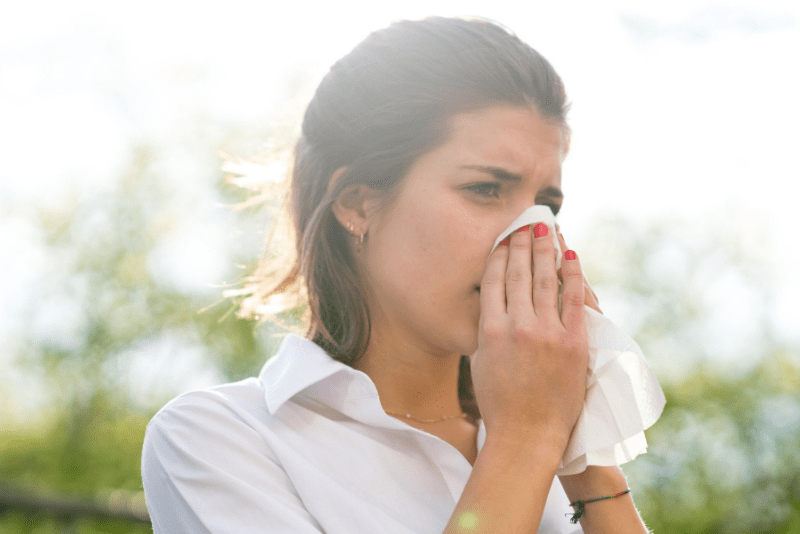Runny nose? Coughing? Sneezing? Congestion? When allergy season and cold season strike all at once, it can be difficult for patients to determine allergies from illness. That’s where our specialists come in! At Charleston Allergy and Asthma, we understand the frustration caused by unidentified symptoms. That’s why our board-certified allergists have created this handy guide to separate colds from allergies.
What are allergies?
Allergies are the result of an overreactive immune response to typically harmless substances, such as pollen or certain foods. When an individual with allergies encounters these allergens, their immune system perceives them as threats and releases chemicals like histamines that lead to symptoms and vary in severity from person to person.
Symptoms: Common allergy symptoms include sneezing, runny or stuffy nose, headaches, fatigue, coughing and itchy and/or watery eyes. In severe cases, allergy patients may experience anaphylaxis.
Timing: Allergies can occur year-round but often worsen during specific seasons when allergens are more prevalent. For instance, pollen allergies (hay fever) are common in the spring and fall.
To learn more about the Lowcountry’s most infamous seasonal allergies, read our blog on the topic.
Duration: Because allergies are triggered by allergens rather than viruses, they can linger longer than colds. Allergies tend to improve once you remove the trigger.
What is a cold?
The common cold is a viral infection primarily caused by rhinoviruses. They result in a range of respiratory symptoms – more on this below – and occasional low-grade fever. Unlike allergies, colds are highly contagious and spread through close contact with infected individuals or contaminated surfaces.
Symptoms: Cold symptoms often include sneezing, runny or stuffy nose, cough, sore throat and the occasional fever or body aches.
Timing: Colds are more common in the fall and winter since they are more easily able to spread as we share indoor space for longer periods of time. To add to this, research has also revealed our bodies’ immune systems are weakened by cold temperatures.
Duration: Unlike allergies, which can affect patients indefinitely without treatment or environmental change, colds are not forever. They usually last for about 7-10 days, with symptoms peaking around the third to fifth day.
“How else can I tell the difference?”
Aside from the identifiers listed above, there are other telltale signs that differ colds from allergies. With a keen eye and this knowledge, you’ll be able to discern when it’s time to see your primary doctor or board-certified allergist.
Begin by examining your symptoms – first by type and then by pattern. For example, fevers will accompany colds, not allergic reactions. On the other hand, itchy or runny eyes are a common sign of allergies but not colds. As for timing, if your symptoms worsen during a specific season, especially when allergens are high (i.e., pollen in spring), it’s likely allergies.
Next, consider your environment. Have you been in close contact with someone who has similar symptoms? If so, it may be a cold. Have you moved to a new region or adopted a new pet? A “yes” here points to allergies!
“What are my treatment options?”
While the signs and symptoms may seem similar, treatment options vary between cold and allergy relief. A board-certified allergist can help you identify your cause of symptoms and place you on the proper path to relief.
For allergies…
Avoidance is key. This includes identifying and minimizing exposure to the specific allergens triggering your symptoms. Over-the-counter allergy medication, such as antihistamines, decongestants and nasal sprays, can help alleviate mild to moderate allergy symptoms. However, you should always consult your allergist for professional insight and treatment recommendations.
While there is no definitive cure for allergies, immunotherapy – such as allergy shots or sublingual tablets – is considered the closest thing. This long-term treatment is conducted over three to five years and slowly introduces your body to an allergen to desensitize your immune system and help overcome symptoms.
For colds…
Treatment is primarily focused on symptom relief, as it’s a viral infection that needs to run its course. Over-the-counter cold remedies can help alleviate symptoms such as sore throat, congestion and cough. Rest, hydration and good hand hygiene are also essential.
Colds are caused by viruses, so antibiotics, which are effective against bacteria, are not useful for cold treatment. The best approach is to support your immune system as it fights off the virus. If your symptoms persist or worsen, consult a healthcare professional.
Sick of dealing with allergy symptoms?
Let’s create your custom treatment plan! Charleston Allergy and Asthma’s board-certified allergy and asthma specialists are ready to support you on the road to allergy relief with allergy testing, personalized treatment plans and immunotherapy treatments. Contact our team to schedule your next allergy appointment.




